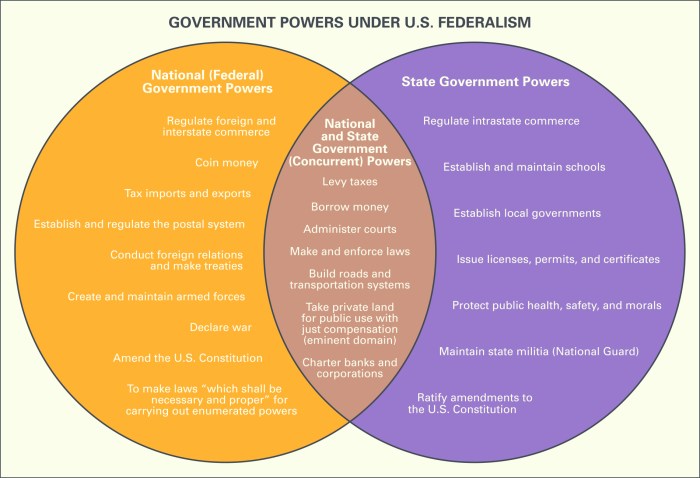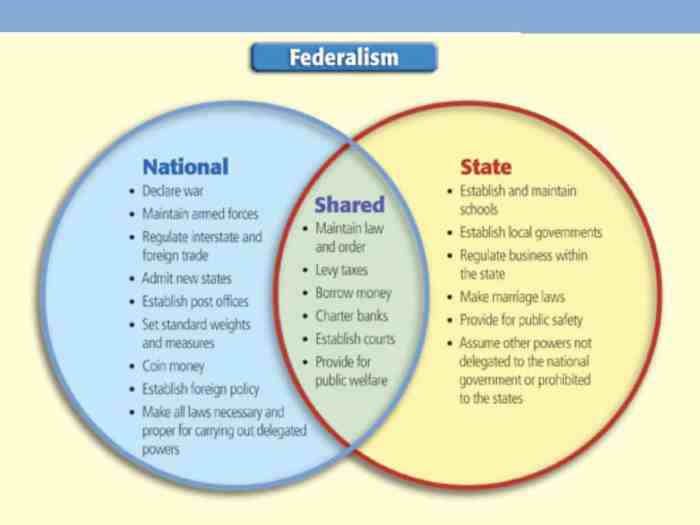Advantages and disadvantages of a confederate government – Confederate governments, characterized by the alliance of independent states under a central authority, present a unique set of advantages and disadvantages. This comprehensive analysis delves into the complexities of such governance models, exploring their potential benefits and challenges.
Confederate governments offer the potential for fostering innovation and diversity by allowing individual states to establish their own laws and regulations. They promote regional autonomy and self-governance, empowering local communities to make decisions that align with their specific needs and circumstances.
Advantages of a Confederate Government
A confederate government offers several advantages, including:
State Autonomy and Self-Governance
- Preserves the autonomy of individual states, allowing them to create their own laws and regulations.
- Promotes regional diversity and innovation by enabling states to tailor policies to their specific needs.
- Strengthens local decision-making and accountability, fostering a sense of ownership and responsibility among citizens.
Flexibility and Responsiveness
- Allows for quick and flexible decision-making at the state level, addressing local issues more efficiently.
- Provides a platform for experimentation and innovation, enabling states to implement innovative policies without hindering others.
- Facilitates the adjustment of policies to changing circumstances, ensuring responsiveness to evolving needs.
Disadvantages of a Confederate Government

Confederate governments also have certain disadvantages:
Coordination Challenges, Advantages and disadvantages of a confederate government
- Coordination of policies and regulations among different states can be challenging, leading to inconsistencies and inefficiencies.
- Harmonization of laws and regulations can be difficult, creating barriers to inter-state commerce and cooperation.
- Resolving disputes between states can be time-consuming and complex, potentially undermining the overall effectiveness of the confederacy.
Lack of National Unity
- A confederate government can weaken national unity and cohesion, as individual states prioritize their own interests over the collective.
- Divergent policies and regulations can create a sense of fragmentation and division, undermining a shared national identity.
- Confederate governments may struggle to address issues that require coordinated action, such as national defense or economic stability.
Centralization vs. Decentralization: Advantages And Disadvantages Of A Confederate Government

The level of centralization in a confederate government significantly impacts its effectiveness and efficiency:
Advantages of Centralization
- Stronger national unity and cohesion, as policies and regulations are more standardized across states.
- Improved coordination and efficiency in addressing national issues, such as defense, foreign policy, and economic stability.
- Reduced potential for conflicts and disputes between states, as central authority resolves disagreements.
Disadvantages of Centralization
- Diminished state autonomy and self-governance, as states have less control over their own affairs.
- Reduced flexibility and responsiveness, as local issues may not be addressed as effectively by a centralized government.
- Potential for overreach and abuse of power by the central authority, undermining the principles of a confederacy.
Historical Examples

Confederate governments have a rich history, with varying degrees of success:
United States under the Articles of Confederation
- A weak confederacy that struggled with coordination and national unity, leading to its replacement by a stronger federal system.
- Demonstrated the challenges of maintaining a confederate government without a strong central authority.
Confederate States of America
- A confederacy formed by Southern states that seceded from the United States, ultimately defeated in the American Civil War.
- Exemplified the potential for conflicts and disputes within a confederacy, as states prioritized their own interests over the collective.
FAQ Compilation
What are the key advantages of confederate governments?
Confederate governments offer benefits such as fostering innovation and diversity through state-level autonomy, promoting regional self-governance, and allowing for more localized decision-making.
What are the potential disadvantages of confederate governments?
Challenges include coordinating policies and regulations among member states, the potential for conflicts and disputes between states, and the risk of a lack of national unity and cohesion.
How does the level of centralization impact confederate governments?
Centralization can influence the effectiveness and efficiency of confederate governments, with varying levels presenting different advantages and disadvantages. Highly centralized models offer greater coordination but may limit state autonomy, while decentralized models prioritize state sovereignty but may face challenges in coordinating policies.